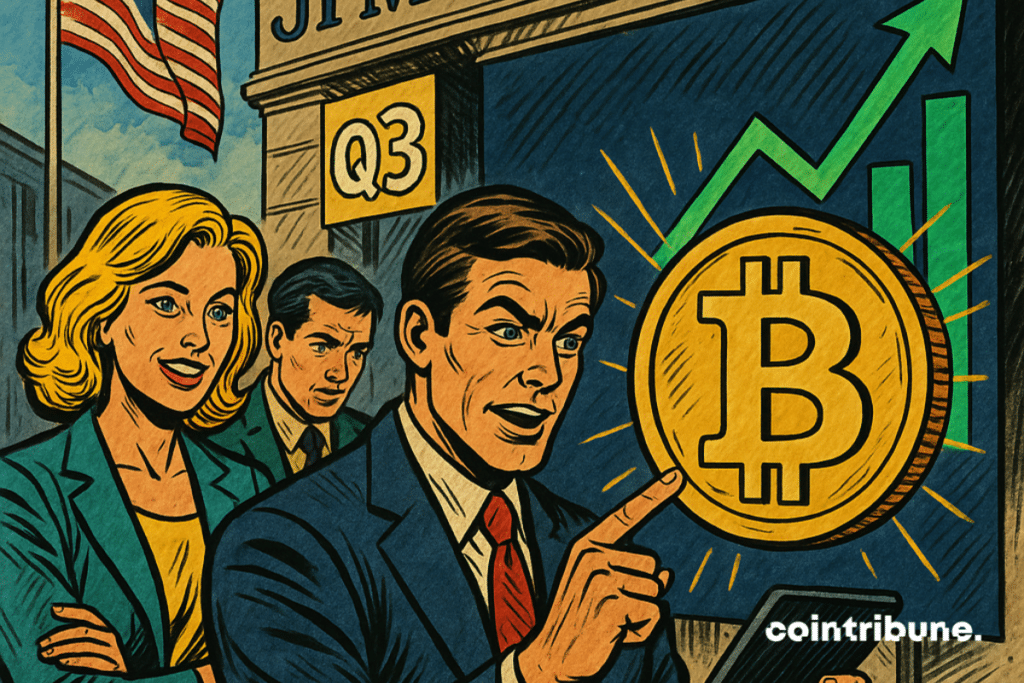Bitcoin accumulation reaches an unprecedented peak according to on-chain data
At JPMorgan, the appetite for bitcoin remains strong. In the third quarter, the bank stated it held 5.284 million shares of the iShares Bitcoin Trust (IBIT) as of September 30, an increase of 64% from the previous quarter. In value terms, this represented 343 million dollars at the end of September. The bet was accompanied by a bullish note: a target of $170,000 for bitcoin in twelve months. Let’s talk numbers, flows, and the direction of the movement.

In brief
- JPMorgan increased its IBIT holdings to 5.284 million shares in Q3 (+64%, $343M), confirming sustained appetite for bitcoin.
- Meanwhile, BlackRock’s iShares Bitcoin Trust accumulated nearly 800,000 BTC, illustrating the appeal of spot ETFs for simple and liquid exposure.
- These institutional accumulation flows strengthen the lows, improve market predictability, and support a bullish scenario (mentioned target: $170,000).
An appetite that shows in the numbers
Positions rose from 3.2 million to 5.284 million IBIT shares in one quarter. That’s significant. In the same movement, BlackRock’s iShares Bitcoin Trust accumulated nearly 800,000 BTC. This is not a simple rebalancing. It’s a build-up indicating that JPMorgan’s brokerage clientele favors the spot ETF as the main vector for bitcoin exposure. Convenient, liquid, compatible with strict mandates; in short, the movement is institutionalizing.
$343 million at September 30, compared to $302.6 million at the end of Q2. Notice the detail: the increase in shares is faster than the increase in value. Indeed, purchases continued even during dips. This is typical of a stepwise strategy. Regular entry points are secured. This smooths the average price. Thus, the next steps are prepared.
Bitcoin was trading around $102,382.99 at the time of this snapshot. At this level, many would have waited. Not these flows. They reflect a “cycle” reading rather than “instant price.” In other words: conviction prevails over noise.
Why IBIT attracts flows
IBIT offers exposure to spot bitcoin without managing direct custody. For treasuries or funds subject to compliance constraints, this is decisive. One click, no private keys to secure. The alpha comes from timing and allocation.
The bitcoin ETF aggregates creations/redemptions that follow actual demand. This reduces the gap to the underlying bitcoin price. Less “tracking error,” fewer surprises. For desks arbitraging intraday, this is a measurable advantage. Implicit costs decrease. Order sizes increase.
If a bank publishes a target of $170,000 over twelve months, it anticipates an improving adoption/liquidity couple. The halving is already digested. Mining becomes more efficient. Portfolio hedging via options generalizes. The bitcoin ETF then becomes the natural gateway. It fits with classic risk policies while capturing bitcoin beta.
What this says about the bitcoin cycle
When disciplined actors buy on dips, the market gains a stronger floor. It’s not the “same bid”; it’s programmed, calibrated flow, insensitive to the daily narrative. Moral: volatility remains, but lows are bought better.
Capital migrates to the most efficient vehicles. IBIT is among those magnets. The greater the market share of spot ETFs, the more predictable the flow structure becomes. Entry windows widen. Execution desks synchronize their algos with creation/redemption cycles.
Maximize your Cointribune experience with our "Read to Earn" program! For every article you read, earn points and access exclusive rewards. Sign up now and start earning benefits.

Fascinated by Bitcoin since 2017, Evariste has continuously researched the subject. While his initial interest was in trading, he now actively seeks to understand all advances centered on cryptocurrencies. As an editor, he strives to consistently deliver high-quality work that reflects the state of the sector as a whole.
The views, thoughts, and opinions expressed in this article belong solely to the author, and should not be taken as investment advice. Do your own research before taking any investment decisions.